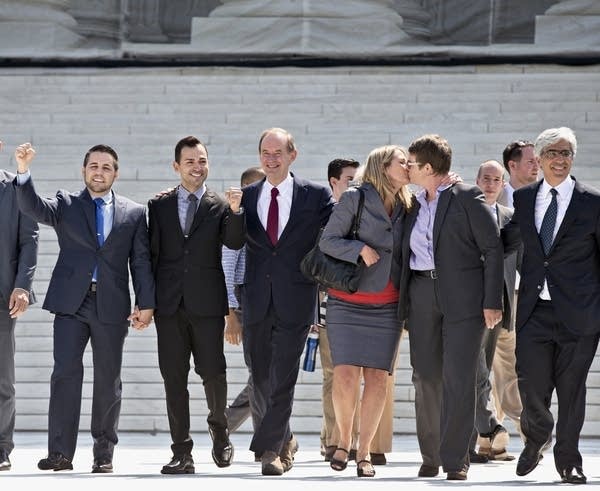With DOMA struck down, Minnesota activists cheer, jeer
Go Deeper.
Create an account or log in to save stories.
Like this?
Thanks for liking this story! We have added it to a list of your favorite stories.

Maria De La Cruz screamed with joy after her colleagues at OutFront Minnesota greeted her with the news that the U.S. Supreme Court had struck down a provision in the federal Defense of Marriage Act.
She and her partner plan to marry next year, thanks to Minnesota's new law allowing same-sex couples to marry. And soon they'll also be able to file federal taxes jointly and be treated as a married couple by the federal government.
"The last two years have been monumental," said De La Cruz, who lives in Hopkins and has 5-year-old twins. "My family can be recognized by our federal government."
At OutFront, the state's oldest and largest gay rights organization, nearly two dozen staffers scanned cell phones and computers to learn of the Defense of Marriage Act (DOMA) ruling and another Supreme Court decision on California's Proposition 8. That decision appears to make way for same-sex marriages to resume in that state.
Turn Up Your Support
MPR News helps you turn down the noise and build shared understanding. Turn up your support for this public resource and keep trusted journalism accessible to all.
SAME-SEX MARRIAGE: FULL COVERAGE
• DOMA struck down, Prop. 8 dismissed
• Minnesota activists react to marriage rulings
• Today's Question: What's your reaction?
• Q&A: The impact on Minnesota tax, benefits laws
• Live blog archive: DOMA ruled unconstitutional
• Download and read opinion: United States vs. Windsor (DOMA)
• Download and read opinion: Hollingsworth vs. Perry (Prop. 8)
The cheers and hugs that followed the rulings were just the latest for Minnesota same-sex couples following a series of victories. In November, Minnesotans voted to reject a constitutional amendment that would have prevented same-sex marriage. Then, in May, Minnesota lawmakers passed a new law legalizing same-sex marriage ceremonies starting in August.
"We get to be married-married!" OutFront director Monica Meyer said. "I think three years ago, nobody would have believed where we are today."
Besides allowing couples to file taxes jointly, the court's decision extends other benefits afforded to married heterosexual couples -- everything from pension benefits to immigration rights.
"I feel like a full citizen," said Rebecca Waggoner, OutFront's anti-violence program director. "I never thought this day would come. Ever."

Waggoner expects the DOMA ruling will also have implications for victims of intimate partner violence. "They will have equal protection under the law in some very specific ways as they are uncoupling and trying to deal with abuse in their relationships. I think it's an amazing ruling," she said.
Mankato couple Sophie Reynolds and Sophie Slater said they were relieved to know they will no longer have to worry about Slater's expired visa. The couple married in Iowa last month, but it didn't help Slater, who is from the United Kingdom, get a green card. She had planned to leave the country in August.
"I'd been looking for someone to sponsor me for a work visa, but it just wasn't happening, so we were really worrying about what the future would hold," Slater said. "This DOMA ruling by the Supreme Court has completely changed our lives. It means we can stay here together now and be a proper couple in the eyes of the law."
Reynolds said the ruling also lets them start a family.
"We didn't want to do that until we could get married and know that we could have a future for our kids with both moms and no fear of one of them having to leave," she said.
Minnesota gay rights group Project 515 got its name for the 515 rights and benefits married couples receive under Minnesota law -- everything from end-of-life issues to joint fishing licenses.
Ann Kaner-Roth, the group's executive director, said there are 1,138 rights and benefits for married couples under federal law.
"This is really an amazing and awesome day for those families and really for all of us as we start to see that level of equality shown from the federal level as well as from the state level," Kaner-Roth said. "This is a big one."
State Sen. Scott Dibble, who sponsored Minnesota's same-sex marriage law, said the ruling allows same-sex couples in Minnesota to enjoy full marriage rights.
"Once we're able to get married in August, couples won't have this strange existence where they have the rights, benefits and responsibilities under state law but can't access the freedoms and opportunities in our federal Constitution and our federal laws," said Dibble, DFL-Minneapolis.
Those who oppose same-sex marriage were disappointed in the rulings. Teresa Collett, a law professor at the University of St. Thomas who supported an attempt last year to define marriage in Minnesota as only between one man and one woman, said the court's decision on DOMA wasn't surprising.
"I'm disappointed but I'm glad they didn't constitutionalize the definition of marriage," Collett told MPR's The Daily Circuit.
Organizers with Minnesota for Marriage, which also worked on the state's defeated marriage amendment and urged lawmakers against passing a same-sex marriage law, agreed that the issue isn't settled.
"I think generally the good news in both of these rulings is that the court did not find a constitutional right to same-sex marriage, which means that citizens and states can still be involved in the marriage debate," said Autumn Leva, a spokeswoman for the group.
The Minnesota Catholic Conference, which also pushed for the state constitutional amendment, said the court rulings are no excuse for opponents of same-sex marriage to give up.
"The court got it wrong," said Jason Adkins, the conference's executive director. "If anything, we're going to be strengthened in our resolve to continue to speak the truth about marriage well into the future."
MPR reporter Matt Sepic contributed to this report.



